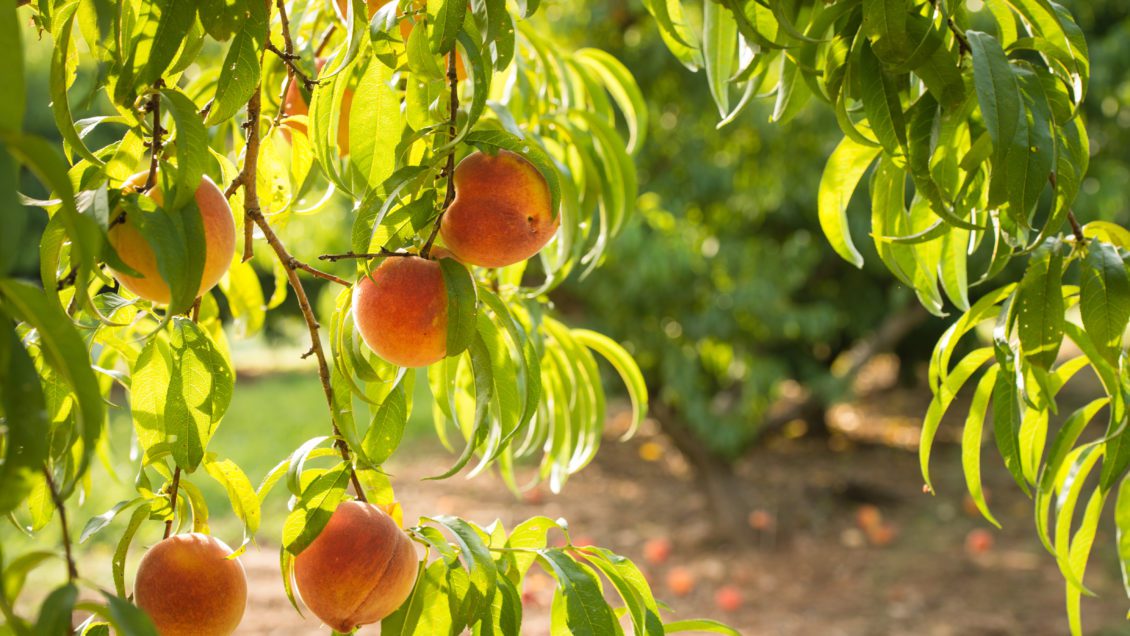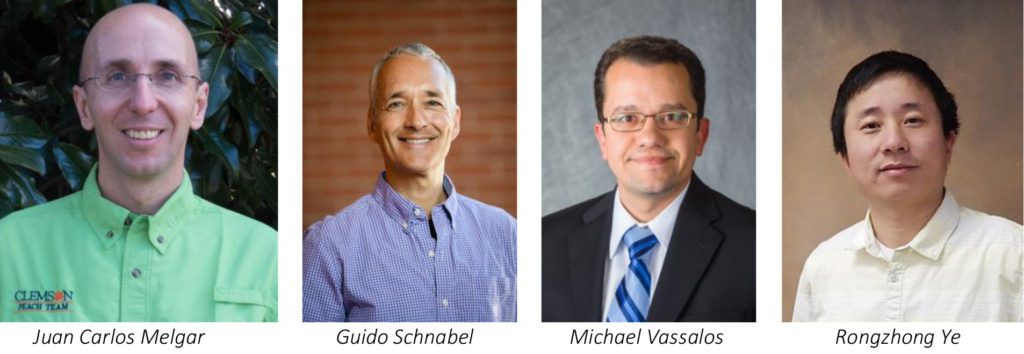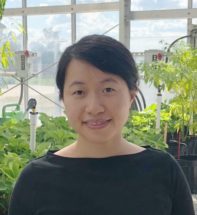
Bacterial spot and bacterial canker are two of the most serious problems we have with our peaches. We need new and better control solutions.
– Robert Jackson, peach grower from Lyman, South Carolina
Much like people, peaches also enjoy the mild climate of the southeastern United States. Sadly, so do pests and diseases, namely bacterial diseases.
A Clemson University team, with the help of a grant from the Sustainable Agriculture Research and Education (SARE) program, is conducting research to fight back by developing holistic strategies to improve disease management and peach tree health.
The goal of the project is to improve sustainability of the Southeast’s peach production, focusing on bacterial canker and bacterial spot diseases.
Bacterial spot and bacterial canker cause an estimated $22 million in annual losses in South Carolina and Georgia. Bacterial spot can lead to severe defoliation of leaves and spots on fruit significantly reduce marketable yields. Bacterial canker on woody tissues leads to shoot death and tree death. Managing these diseases is very challenging.
The research team consists of Clemson experts on the university’s main campus and research stations across the state: Hehe Wang, a plant bacteriologist and pathologist housed at the Edisto Research and Education Center (REC) near Blackville, South Carollina; Rongzhong Ye, a soil scientist housed at the Pee Dee REC near Florence, South Carolina; and on the main campus in Clemson, South Carolina, plant pathologist Guido Schnabel and pomologist Juan Carlos Melgar in the Plant and Environmental Sciences Department and Michael Vassalos, an associate professor of agribusiness in the Agricultural Sciences Department.
“Currently, no chemical control options are available for management of bacterial canker and bacterial spot management mainly relies on weekly sprays of copper and antibiotics during the growing season,” Wang said. “These chemicals could negatively impact the environment and have led to emergence of copper-tolerant and antibiotic-resistant pathogens, indicating an even greater need for new management options.”
There are no cultivars with absolute resistance to either of the two diseases. Just a few cultivars are tolerant to bacterial spot and no cultivar has tolerance to bacterial canker.
During the study, researchers will work with peach producers and a team of plant pathologists, horticulturists, soil biogeochemists, economists and entomologists to manage bacterial diseases, improve tree health and performance, enhance soil and boost profits for peach growers in the Southeast.
“We will conduct outreach activities to assist peach producers with adoption of new spray programs and soil practices,” Wang said. “We also will share our results with the scientific community, as well as increase equity of underserved producers in the southeastern United States.”

Diversity, equity and inclusion in peach production
Of the 270 commercial peach farms in South Carolina, few are owned or operated by underserved producers. Historically farmers considered underserved by the United States Department of Agriculture (USDA) include: American Indians or Alaskan Natives, Asians, Blacks or African Americans, Native Hawaiian or other Pacific Islanders and Hispanics. During this project, Clemson researchers will work with the Sierra Club, and Clemson Extension’s South Carolina New and Beginning Farmer program (SCNBFP) and South Carolina Women’s Ag Network (SCWAgN) to develop relationships with these producers
“The goal is to inquire the possibility of getting them into peach production and to conduct a needs assessment to find out what technical information they need to start growing peaches,” Wang said. “During this project, we will help underserved peach producers by providing trainings on our new organic practices to improve the sustainability of their farms. We also will work towards bringing more underserved producers back into the peach industry.”
Robert Jackson owns Jackson Farms II in Lyman, South Carolina. Peaches and other fruits, as well as vegetables and fresh cut flowers have been grown on the farm for more than 20 years. Jackson serves on the project’s advisory committee.
“Bacterial spot and bacterial canker are two of the most serious problems we have with our peaches,” Jackson said. “We need new and better control solutions. Research from this project will be used to develop new sustainable practices to control these two diseases, as well as improve soil health and food safety.”
In addition to developing new controls for bacterial canker and bacterial spot, Jackson also said he is pleased the project involves attracting more minority producers back into peach production.
Training conducted during the project includes annual field days and workshops led by Melgar and Schnabel at Clemson’s Musser Fruit Research Center, one of the Piedmont REC research farms. Additional training will include teaching producers about environmentally sustainable growing options developed by the researchers. Information from the workshops and training will be available in both English and Spanish and posted on YouTube.
Worker safety
Worker safety also will be addressed during the project. The southeastern United States peach industry supports more than 10,000 underserved workers, especially Hispanic workers. Pesticide applications with tractors pulling air blast sprayers are conducted almost exclusively by underserved farm workers.
Although protection equipment is required by law, many times workers face risks associated with exposure to the chemicals. At larger peach farms, sprayers are used every day throughout the production season, from March to August, to combat pests and diseases, putting applicators are at risk of exposure to pesticides including copper and antibiotics.
Orchards are hand-thinned between April and May, summer-pruned between May and June, and hand-harvested between May and August by many crews of mostly underserved workers, who are exposed to the pesticides that were applied with air blast sprayers to the trees. During this project, researchers seek to find safer alternatives to using copper and antibiotic sprays that will result in their reduced use and lower risk of pesticide exposure for workers.
“We expect our findings to benefit the entire production system of peach as well as other stone fruits affected by the same diseases, and to contribute to the long-range improvement of agriculture in the United States,” Wang said. “In addition, our research is expected to sustain the Southeast peach industry by increasing tree resilience and reducing the significant economic losses to bacterial diseases, thus sustaining existing jobs and perhaps even increasing the number of jobs in this business for underserved workers.”
-END-
Get in touch and we will connect you with the author or another expert.
Or email us at news@clemson.edu

